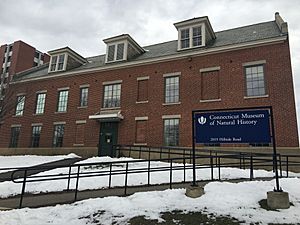Connecticut State Museum of Natural History facts for kids
| Established | 1985 |
|---|---|
| Location | Storrs, Connecticut, US |
| Type | Natural history museum |
The Connecticut State Museum of Natural History (CSMNH) is a special museum located at the University of Connecticut in Storrs, Connecticut. It became Connecticut's official natural history museum in 1985.
Contents
What the Museum Collects
The museum takes care of many natural history and archaeological items. These collections come from Connecticut and other places.
Natural History Treasures
The natural history collection has over 6,000 objects. You can find fossils, minerals, shells, and taxidermied insects, birds, and mammals. One very famous item is the "Pope Mastodon." This huge mastodon skeleton was found in 1913. It is one of the biggest and most complete mastodon skeletons ever discovered in New England.
Exploring Human History
The museum also houses the Office of State Archaeology. This office holds the largest collection of Connecticut archaeology. It covers one million years of human history and culture! The cultural collections include ancient stone tools. There are also many Native American artifacts and cultural materials from Connecticut.
How the Museum Started
The University of Connecticut first created the museum in Storrs in 1982. It officially became the State Museum of Natural History in 1985. The museum opened its doors to the public that same year.
The Founder's Vision
The person who started the museum and worked hard to create it was Carl Rettenmeyer. He was a biology professor at UConn. Carl Rettenmeyer was the museum's first director. He led the museum from its beginning until he retired in 1996.
Moving to a New Home
In 2000, the museum moved into its first permanent space. This new home was in a campus building on Hillside Road in Storrs.
Changes and New Directions
In August 2016, the University of Connecticut closed the museum's physical exhibit spaces. The building on Hillside Road was then used for other university offices. Even though it doesn't have a main exhibit hall anymore, the museum still does important work.
The museum continues to care for its large collections. It also works with the community through outreach and education programs. The museum hosts many events. It also creates permanent exhibits that are placed around the UConn campus. Plus, it makes temporary exhibits that move to different locations.
As of 2025, the University of Connecticut is working on an exciting project. The Institute of the Environment, which oversees the museum, is planning a "Living Building" initiative. The Connecticut State Museum of Natural History is planned to be a main part of this new environmental center.


